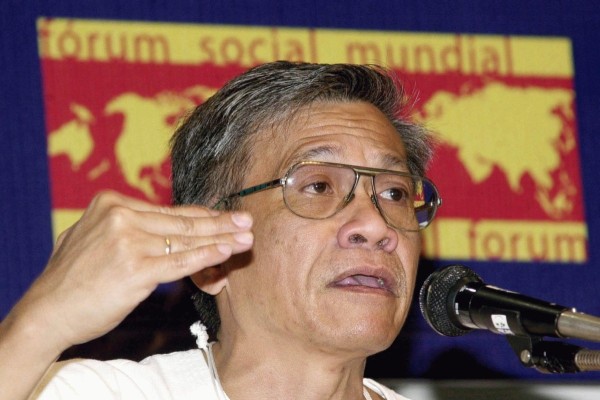Western Marxism and the world crisis
With the dramatic rise of China and the global crisis of capitalism, Marxists are being forced to reconsider their own history

A section from Diego Rivera’s “Man, Controller of the Universe,” depicting Leon Trotsky, Friedrich Engels, and Karl Marx, in the Palacio de Bellas Artes, Mexico City. Image from Wikimedia Commons.
The political consequences of the emergence of China as a leading force on the world stage continues to reverberate. China, a great historic empire and civilization and a victim of Western imperialism, has been dramatically transformed into a powerful state which is challenging centuries-old capitalist and Western dominance. It has an economy which leads the world in trade and manufacturing and technological, scientific and environmental innovation. Faced with this challenge the United States and its Western allies are responding with a new Cold War in the Pacific and East Asia. The alarm of these capitalist countries toward the so-called China threat is all the greater because it proclaims itself to be a socialist country whose official ideology is Marxism.
The global success of this gigantic socialist and Marxist state in East Asia is even having an effect on Marxism itself. As is well known, Marxism is in the throes of a great intellectual renewal worldwide reinforced by the ongoing capitalist crisis and the intellectual and political exhaustion of liberalism, neoliberalism, postmodernism and even cultural studies. But now in the face of the rise of China and the world capitalist crisis Marxism and Marxists are being forced to reconsider their own history through the publication of Domenico Losurdo’s groundbreaking Western Marxism: How It Was Born, How It Died, How It Can Be Reborn by Monthly Review Press (2024). Long a militant on the Italian left and a professor of philosophy at the University of Urbino, Losurdo has published some 50 books on bourgeois thought, Marxism and the communist movement in his lifetime. His best-known works available in the Anglosphere up to now are Liberalism: A Counter-History (2005) and War and Revolution: Rethinking the Twentieth Century (2015).
His most recent work available in English takes its title from Perry Anderson’s work Considerations on Western Marxism (1976) in which Anderson calls for a final and complete separation between Western Marxism and the travesty of Marxism that marks the officially Marxist and socialist countries located mainly in the East but also in the Global South. Anderson, described by Losurdo as “an English philosopher, Marxist and communist (Trotskyist)” thereby puts the political thought and ideology of the Soviet Union and its European satellites, as well as the People’s Republics of China, Vietnam, and Korea, but also the affiliated communist parties in countries like France, Italy and Chile, beyond the pale. As the introduction by Jennifer Ponce de Léon and Gabriel Rockhill points out Anderson believes that Western Marxism was the product of the failure of the October Revolution to spread to the West and the triumph of Stalin and the policy of building socialism in one country. Open and democratic debate and decision-making was proscribed. This led to the withdrawal of Western intellectuals from politics and into the universities and their shift away from political and economic issues in favour of aesthetic, cultural and philosophic questions and their injection of non-Marxist elements into historical materialism. Western Marxism was marked also, we should underscore, by its isolation from the working class and ongoing hostility to the Soviet Union and its allies, albeit their opposition was from the left. Unlike in the East and Global South, Western Marxism in effect abandoned the effort to make mass revolution.
Losurdo decries this turn, pointing out, for instance, that in 1975, the year before Anderson published his work, the Vietnamese Revolution triumphed and the Americans were forced to flee Saigon. He notes caustically that this victory was without philosophic relevance to Anderson. And he suggests that Anderson having written off the Marxism of the East was apparently uninterested in asking himself what philosophical theory and what political line made this great victory of the anti-colonial revolution possible. Indeed, the Vietnamese Revolution and the Chinese and Cuban Revolutions before it were part of the communist movement guided by versions of so-called Eastern Marxism. As Ponce de Léon and Rockhill point out the supposed defeat that Anderson claims is the hallmark of Western Marxism was marked by considerable advances including the defeat of fascism, the weakening of imperialism as a result of the anti-colonial revolts, and social and economic reforms in the West. Eastern Marxism had a lot to do with these advances.
Losurdo claims that Western Marxism was guilty of a fundamental misapprehension of the Soviet Union, the East and the Global South. Fundamentally, socialist revolution in these impoverished and exploited places was primarily about overthrowing imperialism and colonialism by building strong states and overcoming social and political reaction and under-development by stressing economic, scientific and technological development at all costs, including the use of political and material coercion. They were not building socialism so much as the preconditions for socialism. By analyzing the writings of a long list of Western Marxists including Lukács, Bloch, Benjamin, Horkheimer, Adorno, Marcuse, Sartre, Althusser, Della Volpe, Colletti, Badiou, Žižek, and Hardt-Negri, not to speak of Foucault and Agamben, demonstrates their incomprehension, distortion of or even outright rejection of what was transpiring outside the privileged West. Losurdo incontestably demonstrates the reality of this misconception while demonstrating that the interpretation of Marxism itself was as much the product of local circumstances as were other universal ideologies like liberalism, nationalism and Christianity.
This divide, which was not simply geographic, was already apparent in the thought of Lenin, Luxemburg and Trotsky and was subject to analysis by Gramsci. But it still exists as witness the ongoing debates about the nature of the Soviet Union or now the People’s Republic of China. In the latter case leftist critics in the West continue to deny that China is socialist despite its claims to be so and despite the fact that the heights of the economy are controlled by the party state which operates under the rules of the democratic dictatorship of the proletariat including democratic centralism and whole-process democracy and in which most of Perry Anderson’s works including Considerations on Western Marxism freely circulate and are openly discussed. At some deep level such critics seem to have fetishized Western style bourgeois and liberal representative democracy as a universal model despite its inherent defects and increasing degeneration into plutocracy. The emergence of socialist China and the collapsing legitimacy of Western democracy have created a new political context globally in which the divisions of the past need to be sublated or transcended by Marxists. That should be done through an ongoing and open debate by the left as a whole about its past and, one would hope, about its future.
Losurdo’s work, which has already engendered much controversy, should rightfully be viewed as the starting point of such a discussion. On the other hand, in his zeal to expose the failure of Western Marxists to grasp the anti-colonialist struggle Losurdo sometimes overstates his case. He critiques Althusser for being hopelessly Eurocentric although it seems clear that the political and intellectual activity of Althusser and the students of his famous seminar were shaped by the anti-colonial struggle in France against the Algerian War, that Althusser’s understanding of the importance of political consciousness and mass mobilization was deeply affected by Maoism and that he had a deep understanding of the relationship between fascism in Europe and imperialism overseas. Sartre, the most outstanding anti-colonialist militant among Western Marxists, is taken to task for stressing scarcity rather than nationalism as the source of revolt in the Global South even though Losurdo himself underscores that overcoming underdevelopment is at the core of the struggle in the poorer nations. He faults Marcuse for properly acknowledging the necessarily coercive nature of post-colonial states even while acknowledging the brilliance of Marcuse’s analysis of the Vietnam War as an imperialist war of the West.
Acknowledging the pointedness of Losurdo’s critique of Western Marxism, there is a certain unacceptable reductionism and schematism in his analysis. This tendency is even more pronounced in the introduction by Ponce de Léon and Rockhill which looks upon Western Marxism as a kind of academic and politically impotent enterprise or even a clever CIA operation in support of a politically disengaged and anti-communist Marxism.
Anderson, the former editor of the highly influential New Left Review, is for them the very embodiment of Western Marxism. Echoing Losurdo they attack him for celebrating “the ‘radical novelty’ of the Western Marxists,” who indulge in bourgeois culture while abandoning praxis, producing theories that have little to no use value for the struggles of the working and oppressed masses. Anderson is further lambasted because he goes on to claim that the innovative spirit of Western Marxism has achieved “a sophistication greater than that of any previous phase of historical materialism.” Anderson is referring to the achievements of greats like Gramsci, Lukacs, Benjamin, Brecht, Sartre, Althusser, Lefevbre, Harvey and Jameson. But we should add that trailing in the wake of these giants are scores of other Marxist intellectuals who have made significant contributions to Marxist thought in recent decades.
Indeed, as the capitalist crisis has deepened over the last half-century a veritable new Marxist culture has appeared in the West which is highly creative and has become increasingly prominent and, in some fields like literature, culture, geography and ecological studies, completely dominant. Rockhill complains that Anderson values these innovations even to the point when they exceed the limits of Marxism. But what exactly are the limits of the Marxist form of critique which by definition is or ought to be open-ended rather than closed and dogmatic? Ponce de Léon and Rockhill further complain that Western Marxists ignore praxis but we have further to ask what is appropriate praxis for Marxist intellectuals? In Gramsci’s view intellectuals of the left should actively strive to create a culture which makes Marxist culture hegemonic. I would argue that recent times have seen important advances in that direction to the point that Marxism is increasingly being understood as the ultimate horizon of the human intellect. The battle of ideas is part of the class struggle. Western Marxists have played the leading role in this important political advance and their achievements cannot be written off. On the other hand, of course, intellectuals are just intellectuals although some pretend otherwise. They should not and cannot be mistaken for the revolutionary vanguard. They simply have their uses.
Henry Heller is a Professor of History at the University of Manitoba. He is the author of The Birth of Capitalism: A 21st Century Perspective (Pluto Press, 2011), The Cold War and the New Imperialism: A Global History, 1945-2005 (Monthly Review Press, 2006) and The Bourgeois Revolution in France (Berghahn Books, 2006).





_600_400_90_s_c1.jpg)




